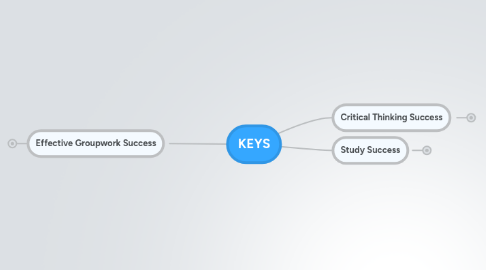
1. Effective Groupwork Success
1.1. Stages of group development
1.1.1. Forming
1.1.2. Storming
1.1.3. Norming
1.1.4. Performing
1.1.5. Adjourning
1.2. Roles
1.2.1. Ideas Person
1.2.2. Investigator
1.2.3. Co-ordinator
1.2.4. Challenger
1.2.5. Analyser
1.2.6. Team Player
1.2.7. Doer
1.2.8. Editor
2. Critical Thinking Success
2.1. Facione's model of critical thinking
2.1.1. Self-regulation
2.1.1.1. ...reflecting on why and how I do what I do.
2.1.1.2. "Thinking about thinking"
2.1.1.3. "Metacognition"
2.1.1.3.1. Metacognitive knowledge
2.1.1.3.2. Metacognitive regulation.
2.1.2. Interpretation
2.1.2.1. ...understanding, clarifying, decoding ideas and texts.
2.1.2.2. Socratic discussion model
2.1.2.2.1. Questions for clarification
2.1.2.2.2. Questions that probe assumptions
2.1.2.2.3. Questions that probe reasons and evidence
2.1.2.2.4. Questions about viewpoints and perspectives
2.1.2.2.5. Questions that probe implications and consequences
2.1.2.2.6. Questions about the question
2.1.3. Analysis
2.1.3.1. ...investigating strengths, weaknesses, similarities, differences.
2.1.3.2. Critiquing tools
2.1.3.2.1. ...analyse a particular published article for its strengths and weaknesses.
2.1.3.2.2. Critiquing Research Journal Articles
2.1.3.3. Comparative analysis
2.1.3.3.1. ...compare a particular published article aginst others to show similarities or differences.
2.1.4. Evaluation
2.1.4.1. ...assessing and making judgements.
2.1.4.2. Standards
2.1.4.2.1. Accuracy
2.1.4.2.2. Breadth
2.1.4.2.3. Clarity
2.1.4.2.4. Depth
2.1.4.2.5. Fairness
2.1.4.2.6. Logic
2.1.4.2.7. Precision
2.1.4.2.8. Relevance
2.1.4.2.9. Significance
2.1.4.3. Toumlin Model of Argument
2.1.4.3.1. Claim
2.1.4.3.2. Data
2.1.4.3.3. Reasoning
2.1.4.3.4. Backing
2.1.4.3.5. Rebuttal
2.1.4.3.6. Qualifier
2.1.5. Inference
2.1.5.1. ...drawing reasonable conclusions.
2.1.5.2. Logical
2.1.5.3. Reasonable
2.1.5.4. Significant
2.1.5.5. Useful
2.1.5.6. Causality or correlation?
2.1.6. Explanation
2.1.6.1. ...presenting ideas with clarity and with justifications.
3. Study Success
3.1. Reading academic texts
3.1.1. Outcomes of reading...
3.1.1.1. ...information
3.1.1.2. ...keywords & vocabularies
3.1.1.3. ...main ideas clarified
3.1.2. Skimming
3.1.3. Summarizing
3.1.4. Synthesizing
3.2. Memory Techniques
3.2.1. Tips for improving memory...
3.2.1.1. ...pay attention
3.2.1.2. ...make associations
3.2.1.3. ...study regularly
3.2.1.4. ...teach, explain concepts
3.2.1.5. ...use mindmaps
3.2.1.6. ...use mnemonics / acronyms
3.2.1.7. ...adequate rest
3.2.1.8. ...oxygen / water
3.2.1.9. ...exercise
3.2.1.10. ...involve as many senses as possible
3.3. Listening Skills & Notetaking
3.3.1. Solutions to common problems...
3.3.1.1. ...ask the speaker to slow down
3.3.1.2. ...come to class having done the background reading
3.3.1.3. ...concentrate on the gist or the main points
3.3.1.4. ...use diagrams, tables, charts etc
3.3.1.5. ...arrange for breaks at reasonable times
3.3.1.6. ...if you have lost the gist, ask the speaker to recap
3.4. Critical Thinking
3.4.1. Criteria for evaluating texts...
3.4.1.1. ...relevance
3.4.1.2. ...accuracy
3.4.1.3. ...how recent?
3.4.1.4. ...supporting evidence
3.4.2. Bloom's Taxonomy
3.4.2.1. Level 1: Knowledge
3.4.2.2. Level 2: Comprehension
3.4.2.3. Level 3: Application
3.4.2.4. Level 4: Analysis
3.4.2.5. Level 5: Synthesis
3.4.2.6. Level 6: Evaluation
3.5. Exam Skills
3.5.1. Before...
3.5.1.1. ...study timetable
3.5.1.2. ...daily goals
3.5.1.3. ...breaks (10mins after each 1hr)
3.5.1.4. ...motivation / reward
3.5.1.5. ...holistic approach to time management
3.5.2. During exam week...
3.5.2.1. ...mock exams
3.5.2.1.1. identifies gaps in your knowledge
3.5.2.1.2. teaches you to think and write under pressure
3.5.3. In the exam room...
3.5.3.1. ...prepare yourself mentally (mind shift)
3.5.3.2. ...listen carefully to last-minute instructions
3.5.3.3. ...read questions carefully
3.5.3.4. ...plan the order of your answers
3.5.3.5. ...make a brain dump (write down mnemonics, etc)
3.6. Planning an assignment
3.6.1. Interpret the essay question
3.6.1.1. focus on nouns first, then verbs
3.6.2. Researching the topic
3.6.3. Brainstorming
3.6.4. Clustering your ideas
3.6.5. Creating & producing a draft
3.6.5.1. <html><b>P</b>oint<br><b>E</b>vidence<br><b>R</b>elevance
3.6.5.1.1. link every paragraph back to the main idea / question
3.6.6. Editing
3.6.7. Proofreading
3.6.8. Referencing
